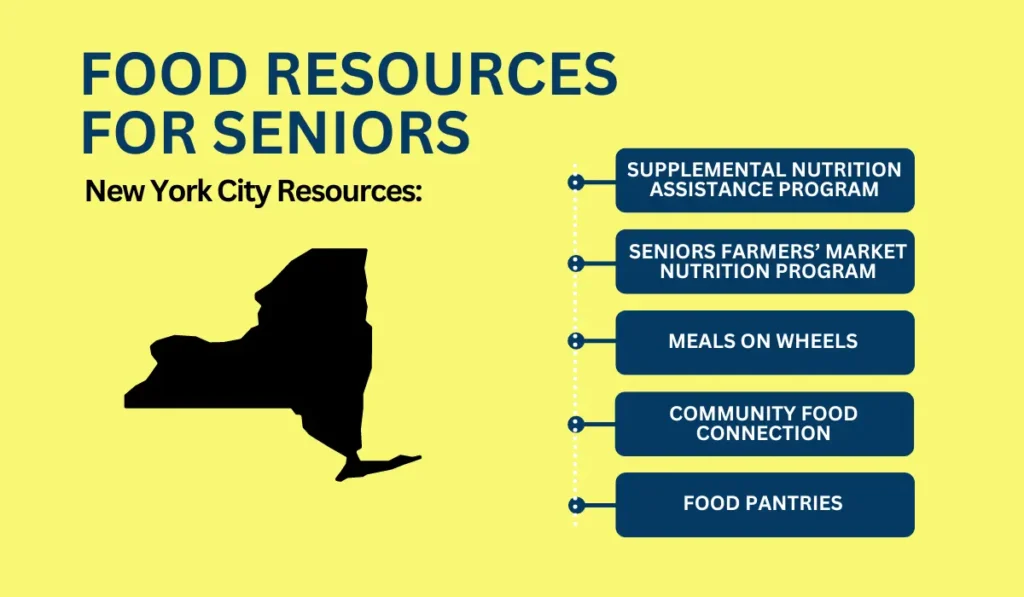Are you looking for ways to ensure your elderly loved ones have access to healthy food in New York City? A healthy diet is crucial for their well-being, and several programs can help.
From SNAP benefits and the Senior Farmers’ Market Nutrition Program (SFMNP) to Meals on Wheels and more, this blog post will guide you through resources that can ensure they get the nutrition they need.
Key Takeaways
- SNAP provides monthly benefits to help seniors afford nutritious food at authorized stores.
- SFMNP offers vouchers for low-income seniors to buy fresh, locally-grown produce.
- Meals on Wheels delivers meals directly to seniors’ homes, ensuring they meet their dietary needs.
- Community Food Connection and local food pantries link seniors to nearby resources to help keep their kitchens stocked.

SNAP (Supplemental Nutrition Assistance Program)
If you’re trying to ensure older adults in your family have access to healthy food, SNAP (Supplemental Nutrition Assistance Program) can be a great resource. This federal program offers monthly benefits to help eligible seniors cover the cost of groceries, which is crucial for maintaining a balanced diet and overall health.
Who Qualifies:
- Income: Must be at or below the federal poverty line based on household size (e.g., $1,580/month for a single person without earned income).
- Documents: You need recent pay stubs, a rent/mortgage statement, a property tax bill, a homeowner’s insurance bill, and a Social Security card.
Seniors can also visit a local SNAP office if preferred over online interaction. Also, they may qualify for expedited SNAP benefits if they are in immediate need.
Seniors Farmers’ Market Nutrition Program (SFMNP)
The Seniors Farmers’ Market Nutrition Program (SFMNP) offers seniors a great opportunity to enjoy fresh, locally grown produce.
This program gives low-income seniors vouchers to use at farmers’ markets, helping them access nutritious food while supporting local farmers.
Who Qualifies:
- Must be 60 years or older.
- Income must be at or below 185% of the federal poverty line.
- Vouchers are distributed on a first-come, first-served basis.
The process of getting vouchers is simple and usually requires proof of age and income. Once approved, seniors can use these vouchers to purchase fresh produce at participating markets.
Meals on Wheels
Meals on Wheels delivers nutritious meals directly to seniors’ homes, making it easier for those who can’t cook to maintain a healthy diet.
This service ensures that seniors don’t just receive food but also the comfort of knowing someone is checking in on them regularly.
Who Qualifies:
- Must be 60 years of age or older.
- Should have difficulty preparing meals due to health, mobility, or other limitations.
- Services may also extend to individuals with certain disabilities.
The application typically involves an assessment to determine eligibility and meal preferences. Once approved, meals are delivered regularly, helping seniors stay nourished and connected with home-delivered meals.
Community Food Connection
Community Food Connection makes it easier for seniors to access nutritious food by connecting them with local resources like food pantries, meal programs, and grocery delivery services. This program ensures that seniors don’t just find food—they find the right food tailored to their needs.
Who Qualifies:
- No requirements. All New Yorkers (even if you don’t live in New York State) are eligible for this food assistance program, so it’s perfect for low-budget seniors.
The process is as simple as using the Food Help NYC function to find the closest source of food assistance. Then you drive over and pick it up (or have someone do it for you). Expect a line in most cases. But it’s a fair trade-off for free food pick up.
Food Pantries
Here are some local food assistance programs to help you get started. These food pantries across New York City are ready to assist immediately:
Brooklyn
- Academy of Medical and Public Health Services: Located at 5306 Third Avenue.
- American Council of Minority Women: Located at 1090 Coney Island Avenue.
- Apna Brooklyn Community Center: Located at 1236 Neptune Avenue, 2nd Floor.
Bronx
- Albanian & American Open Hand Association: Located at 2141 Holland Avenue.
- BronxWorks: Located at 60 East Tremont Avenue.
- Part of the Solution: Located at 2759 Webster Ave.
Queens
- Mt. Moriah AME Church: Located at 116-20 Francis Lewis Blvd.
- CHAZAQ Organization USA: Located at 141-24 Jewel Ave.
- SCO Family of Services: Located at 1415 Kellum Place, Suite 140.
Manhattan
- Cabrini Immigrant Services of NYC: Located at 701 Ft. Washington Ave.
- Catholic Charities Community Services: Located at 1011 First Avenue.
- City Meals on Wheels: Located at 355 Lexington Avenue.
Staten Island
- Community Health Action of Staten Island: Located at 56 Bay Street.
- Dr. Theodore A. Atlas Foundation: Located at 543 Cary Avenue.
- Tomchei Shabbos of Staten Island: Located at 22 Niles Place.
Essential Tips for Senior Citizen Food Assistance
In addition to the previous resources, there are a few other practical steps you can take to help ensure your senior loved ones have steady access to nutritious food:
- Stay Connected: Regularly check in with local senior centers and older adult centers for updates on available services. The Food Bank for New York City is also great.
- Leverage Services: Utilize meal delivery options like Citymeals on Wheels and participate in programs like the Commodity Supplemental Food Program (CSFP) for fresh fruits and groceries.
- Use Referrals: Contact social services or visit nyc.gov for referrals to food banks, soup kitchens, and other support.
- Prepare Documentation: Prepare the necessary documents like income proof and ID ahead of time.
By following these tips, you can ensure your senior loved ones stay well-nourished and supported.